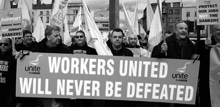
The 26-County state appears to be heading for strikes and industrial unrest on a scale not seen for many years after Ireland’s major trade unions announced protest actions ahead of the December budget.
The planned protests and stoppages stem from two separate but linked issues -- the clear message by the Dublin government that further pay cuts for the 300,000-plus workers in the public sector are on the agenda for the Budget in December, and also from the deep unhappiness of the trade union movement at the government’s refusal to consider an alternative approach that would be both feasible and fairer.
The Dublin government is still hoping that an agreed economic recovery strategy can be negotiated with the unions, employers and other social partners. However, at this stage, the prospect of such a deal is almost nil.
Both sides are very far apart and entrenched, to a degree that talks appear almost pointless.
On Tuesday night Taoiseach Brian Cowen and Minister for Finance Brian Lenihan told trade union leaders that the 26 County public sector pay bill will be cut by 1.3 billion Euro next year -- the first time such specific figures had emerged.
The 26-County cabinet is planning to reduce expenditure this year by up to 4 billion Euro, and it has specifically targeted not just the public sector payroll, but also public sector pensions and social welfare.
The unions believe that there is scope for increased borrowing and that higher taxation for the wealthy should form a part of the equation.
The Irish Congress of Trade Unions (Ictu) is planning to bring tens of thousands of people out on to the streets in eight locations on Friday, November 6th, as part of a campaign in favour of a “fairer way” of tackling the problems in the public finances.
Ictu has insisted that its day of protest is not a national strike. However, Ictu president Jack O’Connor said yesterday that it would be encouraging workers to “take time off” to attend.
If the rallies are successful -- and the last Ictu street demonstration in February attracted up to 120,000 people -- much of the country could come to a halt on that Friday afternoon.
Meanwhile, members of Impact, the largest public sector union, voted overwhelmingly for strike action in the apparently inevitable event of Dublin cutting pay.
At the same time, nursing unions are bracing for industrial action if the government reduces either pay or the various allowances or premium rates.
Many unions are considering other pre-emptive action, with dates in late November for a possible one-day stoppage being mentioned.
Either way, the fragile Fianna Fail government is facing mass marches on the streets and a state wreathed in picket lines.
Sinn Fein accused Finance Minister Brian Lenihan of lacking the political to make the hard decisions and that it was resorting to targeting the vulnerable instead.
“The government is lying about the solutions to this crisis,” he said.
“They are lying about the constraints they face in the budget. They do not have the political will to make the hard decisions on taxation, which would involve raising money from the wealthiest in society who happen to, by and large, support government policies on this matter.
“The government is choosing instead to target the least well off because they believe that they are a group with no voice and will take these cuts lying down.
“Sinn Fein cannot let this government get away with this lie. There is money in this state that can be raised. Cutting services will not only harm society but it will contract the economy even further.
“This government does not have the political will, or the priorities, to ensure that we come out of this recession in a manner that protects to most vulnerable sections of society.
“They must be removed from office before they do anymore damage to the economy and society.”
![[Irish Republican News]](https://republican-news.org/graphics/title_gifs/rn.gif)
![[Irish Republican News]](https://republican-news.org/graphics/title_gifs/harp.gif)

